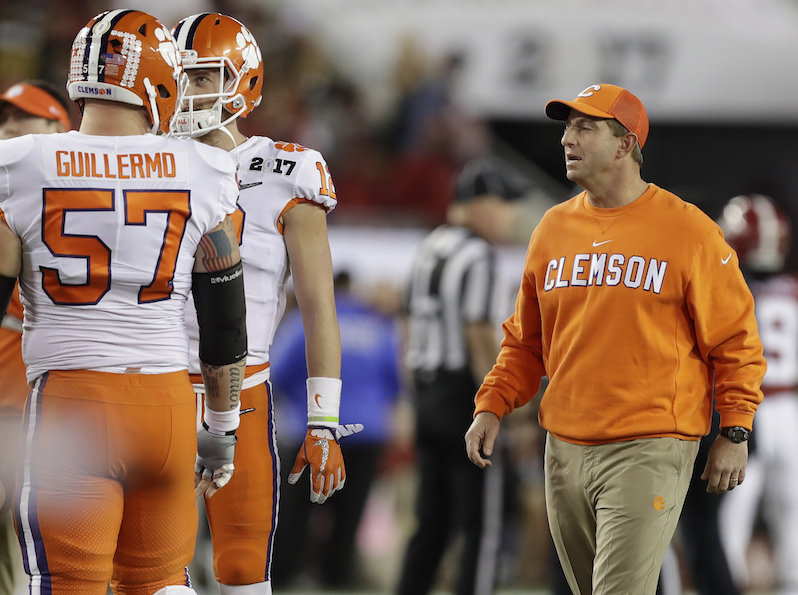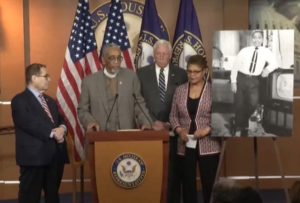Don’t Blame ‘Big College’ Coaches for Creating Institutionalized Corruption
Clemson’s win over Alabama in college football’s national championship game didn’t impress sports writer Dave Zirin. But his scathing critique in The Nation missed the point.
Clemson’s Dabo Swinney, right, won his first national championship as a head coach against Alabama, his alma mater. (Chris O’Meara / AP)
Sports writer Dave Zirin did not enjoy the Jan. 9 college football championship game. Many might have seen Clemson University’s 35-31 comeback win over the University of Alabama as one of the most exciting college games of the year. Actually, Zirin may have, too, but he chose not to mention it.
In a Jan. 12 piece for The Nation, he wrote, “Something rotten wafted through the exhilarating, note-perfect college football championship game between the Clemson Tigers and Alabama Crimson Tide which ended with Clemson’s last second 35-31 upset victory.”
A great number of things upset Zirin. “Two schools from the heart of Dixie. Two head coaches in Nick Saban and Dabo Swinney who make staggering sums of money. Two teams that are overwhelmingly African-American and—in a move that might make past alumni spin in their graves—led by African-American quarterbacks. Two teams with defenses unafraid to unleash helmet-to-helmet hits against their opponents: hits that sent these ‘amateur’ players into a sideline ‘tent’ where they could be ministered to by school trainers away from prying eyes. Two teams whose rabid student sections were overwhelmingly, if not entirely, white, living vicariously through the violent exploits of their black classmates.”
I’m not sure what it is about the tent that Zirin objects to, or whose are the “prying eyes.” The tent simply allows players to receive the same medical attention near the field that they would get in the locker room. Who wants to watch a 300-pound tackle strip down to his jockstrap in front of 100,000 fans and TV cameras?
Zirin writes all of this as if he were the first person ever to notice these issues. And he glosses over each item as if there were no rejoinders to be made.
“Two schools from the heart of Dixie.” What’s wrong with that? Should the only schools that compete for national championships be from the Midwest or the West Coast? Has Zirin not noticed that schools from the heart of Dixie have dominated college football for more than half a century?
“Two head coaches … who make staggering sums of money.” Well, yes, but surely no one doubts that these men are compensated in proportion to the huge profits they make for their universities.
And what is wrong with the teams being “overwhelmingly African-American” and being led by “African-American quarterbacks”? I would think that this is one of the redeeming aspects of modern college football, providing a platform for young black athletes to make it to the lucrative NFL.
What is wrong with “defenses unafraid to unleash helmet-to-helmet hits against their opponents”? Oh, wait, I almost missed this one—and so did Zirin—entirely. Helmet-to-helmet hits are now illegal. It’s called “targeting.” But if he means unafraid to unleash the hardest hits possible, then he is condemning the entire sport of football—high school, college and pro. I’m not saying there isn’t an argument to be made that football is ultimately too violent and too destructive as a sport. But that doesn’t seem to be the one Zirin is making here.
Zirin puts quotes around “amateur” players, as if to imply that the players aren’t really amateurs. I’m not sure what his point is, because one of the genuine arguments to be made against college football and basketball is that the players, who are generating huge sums, are in fact amateurs—they don’t get paid.
Then there’s the “rabid student sections” that are “overwhelmingly, if not entirely, white, living vicariously through the violent exploits of their black classmates.” Aren’t largely white crowds “living vicariously” through black athletes pretty much a definition of all American sports (with the exception of hockey)?
Further, Zirin writes, “These are also two schools where the history of the South hangs like a nightmare over the 21st century campus.” Here we go: “The University of Alabama’s past is a central history of the black freedom struggle in the United States. It’s where segregationist Governor George Wallace tried to physically block the University’s doors.” Actually, what Wallace did was make a show of blocking the doors, but let that pass, too. “And Clemson is built on the ground of notorious vice president John C. Calhoun’s plantation. Calhoun was perhaps the country’s most prominent 19th century spokesman for using African bodies as slave labor.”
I don’t want to belabor the obvious—that’s Zirin’s job. But not only were Calhoun and Wallace virulent segregationists, our nation’s very capital was named after a slave-owner. Why are we flogging Southern football teams for the sins of slavery when the fact that black athletes dominate Southern football is one of the more encouraging aspects of the last 50 or 60 years?
Let me state this yet another way. Wouldn’t the same criticisms of modern college football be valid if the national championship was played between the teams that Clemson and Alabama beat to get to the big game, Ohio State and the University of Washington? (Oops, I forgot: The latter state was also named after a slave-owner.)
Why is it only schools in the South where the history of slavery and Jim Crow “hang like a nightmare over the 21st century campuses”? I would suggest to Zirin and many others that they look at the story of Jesse Owens at Ohio State (captured with something close to historical accuracy in last year’s film “Race”).
Zirin’s conclusion is that “college football is a septic tank of entitlement. It’s a fungal culture created by the head coaches of Big Football. [Clemson head coach] Dabo Swinney is the very embodiment of that culture: adrift, clueless, and filthy rich.” I’m not going to quarrel with that observation except to say that except for the filthy rich part, that’s pretty much the case with just about every football coach at every high school and college institution in the country. If you choose your football coaches on the basis of enlightened consciousness, you won’t win very many games.But I take issue with the idea that the institutionalized corruption (a term I consider much more germane to this topic) starts with “the head coaches of Big Football.” Sorry, but don’t try to write this off to Walter Camp, Knute Rockne, Bud Wilkinson and Bear Bryant. Their job as they saw it—right or wrong, and whether or not college sports can actually accomplish such a thing—was to prepare young men for success in society. Not success in the National Football League or the National Basketball Association, which is what college sports are geared for today.
The big, dirty secret of the pro football boom—and professional basketball as well, while we’re at it—is that unlike big-league baseball, the NFL and NBA do not pay a single dollar for player development. They have a cost-free minor-league system in America’s colleges—and if you follow the pipeline back to its sources, you find that much of this expense is borne by taxpayers.
At New York University in 2012, authors Malcolm Gladwell and Buzz Bissinger debated ESPN columnist Jason Whitlock and former college/NFL player Tim Green on whether college football should be abolished. Gladwell and Bissinger argued that it should be banned. Surprise—the audience declared them the winners.
College football is corrupt, it was decided—too violent, too dangerous, too exploitative of its players. But no one touched on the real issue: Should pro football be abolished? Is it any less violent or dangerous than the college game? Is it any less exploitative?
Feb. 1 is National Signing Day, the first day a high school football player can sign a national letter of intent to play football in college. This ritual makes it sound as if college football players have some measure of freedom, but in truth, all it does is allow them to pick the school that will exploit them.
Even if they’re lucky enough to become one of the 1 percent who gets a shot at the NFL through the draft that comes at the end of every April, they have almost no say about which team owns them. Unless, as John Elway and a select couple of others have done, they play a second sport, such as baseball, and can threaten to bail on pro football if they don’t get the team and the deal they want. But only a few of the best athletes are lucky enough to play one sport at the professional level, let alone two.
Yes, the NFL pays its players—the handful from college that make it to the NFL, that is. But what about the thousands and thousands of college players over the decades who gave their bodies with no compensation? The NFL and the NBA wouldn’t exist—at least as we know them now—if the colleges weren’t feeding them their players. And college football as we know it wouldn’t exist without the carrot on the stick: the NFL contract that less than 1 percent of the players are ever going to get.
I wonder if Gladwell and Bissinger and any other critics of college sports think of this when leaning back in their easy chairs watching the New England Patriots play the Denver Broncos or the Golden State Warriors play the Cleveland Cavaliers? There is something of an irony in the fact that the NBA’s greatest player, LeBron James, never went to college. But he’s one of the very few in professional football or basketball who didn’t.
If Zirin, Gladwell, Bissinger, et al. really want to reform college sports, start at the top, where the corruption really begins. College coaches didn’t create the system: The NFL and NBA did.
With an uncertain future and a new administration casting doubt on press freedoms, the danger is clear: The truth is at risk.
Now is the time to give. Your tax-deductible support allows us to dig deeper, delivering fearless investigative reporting and analysis that exposes what’s really happening — without compromise.
Stand with our courageous journalists. Donate today to protect a free press, uphold democracy and unearth untold stories.









You need to be a supporter to comment.
There are currently no responses to this article.
Be the first to respond.